
I stumbled last night upon a Mary Oliver poem (in her collection Blue Iris) I didn't recall reading before, or maybe it was just that it is about something my friend Barb and I had been discussing earlier. In the poem, "Count the Roses," Mary Oliver moves from instructions, to questions, to conclusions about the mind and about roses. Then she says:
"Yes, the mind takes a long time, is otherwise occupied
than by happiness, and deep breathing."
And the focus of the poem changes, moves from the mind's words to "now":
"Now, in the distance, some bird is singing.
And now I have gathered....
and now I have put....
and now I am moving....."
With each "now," especially when reading the poem out loud, as I was, the breath drops and the mind stills, moves from past and future to the present moment. Eventually, Oliver concludes, "finally even the mind comes running, like a wild thing, and lies down in the sand."
"Eternity is not later, or in any unfindable place.
Roses, roses, roses, roses."
We had been talking, Barb and I, about our experience of eternity in the moment: Barb in her long-time practice of Tibetan Buddhism, I in the all-knowing silence of a tree, or more recently in my cat's gracious bending to caress my cheek with his when I was feeling sad living in a moment already gone -- recalling me to the present. It had made me wonder about the relationship between such moments and all the pain. Mary Oliver addressed that question, too:
"Does it bother you, that mercy is so difficult to understand?"
That question was in the first part of the poem, the mind's part. By the end of the poem, Oliver has moved the reader, through the breath, beyond the question "that can't be answered." I'd had the same experience that night with my cat. There is breathing, in this moment, breathing in roses, or incense, or purring, or the hum of a Tibetan bowl. And there is, just on the other side of some membrane's thickness, all the pain out there that is always changing but equally eternal.
And there is some relationship, but I don't know what it is. It seemed very clear that night, though, that the breathing moment is eternal, and is more real than what eternally moves on the other side of the membrane.
Monday, December 18, 2006
Eternity is not later
Saturday, November 25, 2006

Annie Morrissey's post today on her thoughtful, spiritual blog soundingbalance is about "speaking the Truth: genocide in Iraq." She said some things that have needed to be said for a good long while now. Since the powerful aren't saying them, it's up to those of us with "eyes to see and ears to hear" to speak our truth, so I'm going to follow her lead and try to speak mine now.
The men, women and children of Iraq are now in a living hell. We have created this hell for them, or rather George W. Bush and his coterie of blind hawks did and we failed to stop him. We did not care enough. And here is the worst of it: there was absolutely no need for the invasion, no need for this hell to be unleashed. I think of our own Civil War. As Americans then suffered physical pain, loss of loved ones, fear, economic deprivation, it was at least their own war. The Iraqi people had this hell forced on them when they were doing no harm to anyone. Nothing at all. Then came American bombs, and occupiers with armor and powerful weapons speaking a foreign language taking over their cities, in many cases ridiculing them, abusing them....men, and even women and children, were thrown into foul prisons where atrocities were committed. And that was just the beginning. And now the experts say it will only get worse, and no one can fix this, and all these people can do is despair. Despair on top of despair on top of despair: children blown up, women raped, husbands and fathers and sons kidnapped, or arrested, or tortured, and killed by the thousands upon thousands upon thousands....
We started this atrocity. For no reason. For reasons that were lies. The blood and pain of these people is on our hands and should be on our minds day in and day out.
We can speak. We can pray for them and their children.
Speak. Pray. And join forces with any of the many individuals and groups who are working to impeach Bush and Cheney. No positive change can happen until they are gone.
Thursday, October 19, 2006

BuzzFlash is linking to a song by Steve Conn called "How Does It Feel?" -- "How does it feel to know you're the one who started the fire that ended the world?" Conn asks George W. Bush. The question is repeated several times in the song (it's a very good song, not just a throw-away protest, and Conn is a talented singer). The question becomes more and more haunting as you listen. Has Bush started the fire that ends the world? It's possible. The more directly you look at what he's done and force yourself to contemplate likely reactions and consequences by the part of the world that is not George W. Bush or his cronies and friends, the more dread grows.
The song especially speaks to me because of a dream I had during the Kosovo crisis. I dreamed I was entering a church; the spirit of my deceased father was to my left in the wings, he had brought me there to see something important. I opened the door to the nave and saw pews filled with congregants and candles lining the aisles and altar. A white-robed minister was administering communion rites to congregants kneeling at the altar. From somewhere behind me, I hear a Dan Rather-like voice blandly say, "and now he will self-immolate." The alter bursts into flames around the minister. He begins to sweat, his eyes grow wide with fear, he stuffs communion wafers into his mouth so he won't scream. I do scream, throwing my arm over my eyes in horror, running from the room. The minister has led the congregation to this ceremony of self-sacrifice. But it is not until the flames begin licking at his own robes that he understands the fire will consume him, too, and feels the terror. And the guilt, perhaps?
If Bush has started the fire that ends the world, I wonder if he will ever feel guilt or fear about it. Conn sings that "some say you're evil, but I'd like to think you're just hungry for love." Maybe. But Bush is also a grown man with a soul to guide him just like all the rest of us. The idea that he might be doing so many horrific things as desperately misguided attempts to belong or be loved would only indicate a level of narcissism that would surely be the same thing as conscious evil.
Friday, October 06, 2006
Cary Grant
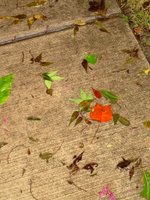

At age 80, Cary Grant said "I've become the person I wanted to be." His eyes were equal, warm, the soul showing through, filled with laughter. In younger pictures the eyes were unequal: one looked straight ahead, wide, the other looked own, closed. He pursued the person he wanted to be all those years. The thing is, I don't think at first he knew who that person was. Do most of us? It seems to me that becoming the person he wanted to be was the alpha and omega of his life. He wanted to be an actor and became one. He wanted to become a really good actor, and he did that too. But it wasn't until he made The Awful Truth that he stumbled on the person he wanted to be, a piece of him anyway. He discovered he could see the humor and absurdity when others around him were frozen in the usual way of seeing.
That seems to be a big part of the person I want to be, or all of us want to be. It's someone who is alive to what he or she really cares about no matter what anyone else wants or is doing, and expresses it, enjoys it.
I'm stumbling on pieces of who I want to be. Today when I was kind to a complete stranger and it took some effort--a postal clerk, made her laugh, instead of fretting about the time or waiting for her to be kind to me. Grant-like. some charm, some humor, some serenity in the midst of life's annoyances.
Monday, September 04, 2006
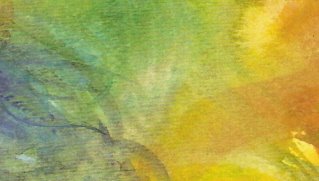
Hidden things--good and bad. The administration's secretive programs could destroy us--will certainly destroy our democracy if not reversed. Then there are other types of hidden things--invisible connections underlying all living things, from the most infinitesmal to the edges of the universe itself (if it has any edges). In these connections may lie the secret to retaking our democracy and reclaiming reverence for life as the only sane option for a species that starts dying the moment it is born, yet relentlessly seeks to kill as if believing that will give it immortality.
Friday, August 25, 2006
Morning songs
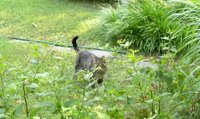

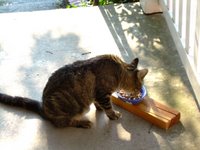
It's been a Mary Oliver kind of morning, the kind she described in her poem "Morning":
Salt shining behind its glass cylinder.
Milk in a blue bowl. The yellow linoleum.
The cat stretching her black body from the pillow.
The way she makes her curvaceous response to the small, kind gesture.
Then laps the bowl clean.
Then wants to go out into the world
where she leaps lightly and for no apparent reason across the lawn,
then sits, perfectly still, in the grass.
I watch her a little while, thinking:
what more could I do with wild words?
I stand in the cold kitchen, bowing down to her,
I stand in the cold kitchen, everything wonderful around me.
My morning pages today--those "roll over and write as soon as you wake up" writing practice pages that Natalie Goldberg recommends--today had become about commitment. Goldberg wrote in Wild Mind that committing to a writing practice allows you to go deeper--into writing, into life. I thought about the way a commitment to a career, a family, a time of crisis seems to bring out the best in us because the small things fall into place. Otherwise they can become fritterings that pull down the whole life. That happened to a tree up the street a few weeks ago. It was a very tall tree with lots of branches filled with healthy green leaves. We appreciated its shade while waiting for the bus to work these hot days. It had massive roots that seemed to rest mostly above ground; the tree slanted across the busy street. We had a long drought, like most of the country, then a day of very heavy rains. That night, in perfect stillness, the tree came down, taking power lines with it. I could only guess that the water weighed down the branches so much they pulled the tree out.
I went outside after writing and listened to the cicadas humming in the trees. The sound rose in front of me, then to the left, then to the right... I closed my eyes and it seemed their music was orchestrated, the groups taking turns raising their sound to a crescendo, then down softly, pianissimo, turning the lead over to the other sections... When I finally opened my eyes I was seeing differently. I got my camera and went slowly from image to image. It struck me that just being present is a commitment, and maybe it's the kind the trees make. Requires no degree, no money, no Blackberry.
Tuesday, August 22, 2006
remembering America
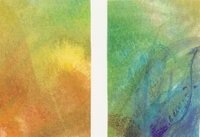
One of my older essays for Common Dreams, but just as pertinent now.
The Memory Project
by Linda O'Brien
More and more Americans are becoming aware there is something very wrong with this administration, and it is frightening them. But there is an emptiness here now where before there was a common thread like a piece of music. We've lost the thread, and the sound is discordant and jagged with vast silences, imbued with fear, between the notes.
To combat the worst designs of the administration, we are going to have to combat fear itself. If we're to have a chance of surviving, much less winning, we have to somehow let the others know we're there for them, not separate or against.
The nation's soul memory has been lost in a fog of induced amnesia. Neither the amnesia nor the emptiness was caused by the attacks of 9/11. It was what came after, when Bush, instead of saying that we are still us, told a nation still in shock that everything had changed, and then proceeded to make that true. The effect was to confirm the insidious thought that comes naturally after a violent assault: "You are not You any more. You were a lie."
Memory and history both were replaced with new realities, a new "identity." "We are vulnerable, we must strike first, they hate us because we are free." Ignoring those who love us, those who fought with us; erasing our role as a light. "We must seek them out here, too, and we must give up some freedoms. I know Americans are with me." So easily, so smoothly, We became I, and Americans not with him became Americans against him. "We" were all but forgotten, split into Us and Them. The strands that held us together are wearing thin; invisible underpinnings are blurred and torn.
And perhaps we are helping, by making our arguments all about Bush. Obliquely, we are confirming that he is America. The reality is that he is almost negligible in the bigger discussion we must have: They're for, we're against, and who are we together?
Right now, we are regaining our equilibrium. Right now, people have found the confidence and sense of self to protest the Patriot Act and Bush. But if we don't clearly redefine, or define for the first time, who we intend to be, then the next great challenge will build on the lost sense of self as well as a decimated social net, ravaged economy, anger, fear, and lost innocence. For months I've been wondering about Germany. Was it just the nationalistic, militaristic propaganda and the manipulation of fear and shame that wiped out enough of a nation's soul to allow Hitler? Or was it also the lack of a sustained countering movement to keep soul, reawaken soul, stir her memory?
I don't think invoking Nazi Germany is too extreme. As Paul Krugman said in a recent interview by the Guardian, "There's this fundamental unwillingness to acknowledge the radicalism of the threat we're facing."
We've never been clear, really, about who we are, and that is why the emptiness exists now. In fact, if this administration hadn't screwed up so very badly, there wouldn't have been enough dissent to create a recognizable split. The next coup that occurs will be far smarter and subtler. Now is the time to turn eyes away from Bush and back towards each other, to stir memory that We are America, not this leader or any other.
To fight against the masterful manipulation of instinct, the intentional arousal of shadow forces in the national psyche, we have to go deeper than instinct and beyond rage. Go for the meeting place of our differences. Not the "center" promoted by some as our salvation--that place characterized by the absence of deeply-held beliefs--but the opposite, the seam where Americans' most powerful beliefs intersect along common root lines.
It's as if a beloved family member had died, and we have to go home to siblings we've never been able to talk to and somehow talk about the most difficult things. There is no formula. It's a talking that is half a listening, a silence. Recently, William Pitt's "I Believe" and Marc Ash's "What I Want" for Truthout, in particular, have done it.
My dream is for someone to fund a "memory project" national newspaper created by the hundreds of brilliant, mostly unpaid internet writers. But the calls to memory don't need to be in words; they can be in any creative form that is your own. I think of Daniel Barenboim's concert for Palestinians in Ramallah recently. A member of the audience said, "He's reaching out to the Palestinian people with the utmost solidarity in a very creative and human way. He touches the soul."
You don't have to be a virtuoso. But you do have to go to Ramallah.
People are sick of the emptiness. When I caught a cab this past September 11, the driver asked if I minded the Vivaldi that was pouring from the radio. He said, "There is too much death and sorrow in the news, so I listen to the music." We have to go to that no man's land separating our perception of reality in this terrifying state of amnesia from theirs and trust that the music in the truest thing we have to say will be heard. Then play like our very lives depended on it.
Who will help a nation of half-amnesiacs remember? It has to be us, and it has to be now. Because we are able, and because we have not forgotten yet, but we will.
a paw in the night
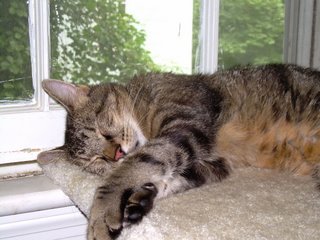
More on the subject of my favorite muse....
The Cat
the cat petted me last night
soft paw reaching he gently stroked my face
I watched amazed
and held my breath.
I don’t know who this cat Is
but he reminds me of meetings
I’ve dreamt of for years
with trees and
animals and
Other that surrounds us.
I held my breath
and wondered how I will feel when he’s gone.
It’s not just connection to him,
it’s connection period
and it doesn’t have to be to human, that’s the thing.
I’ve felt more connected to trees and air
at times
than to people;
I’ve known that I’m embraced by them
and in my vision of the afterlife this Meeting finally happens,
stops tantalizing and
explodes like a birthing star.
It can never happen here on earth
it can only call
to those who listen,
if it happened here there would be no Other
there would be no need to join
to meet;
and God would cry
because it is God who calls
I think
and the devil is
just our withdrawing from
the touch
the paw in the night,
afraid to hold our breath
we say,
it’s just a cat.
Monday, August 21, 2006
when the cat goes, I'll be a river
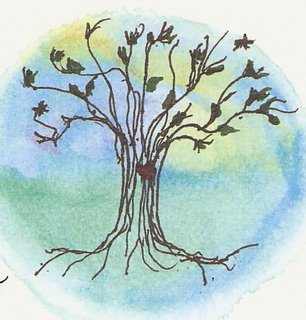
when the cat dies I think, I’ll be ready to go too
to become part of the grass
and trees
or maybe water
water like the creek flow
clear, still, reflecting everything
sky trees air breathing into it.
water can’t be killed
if it overflows its banks it becomes part of the soil
if it’s drunk it becomes part of the animal
if it evaporates it becomes part of the sky
yes, I’d like to be water.
or a tree—but that would require some learning I fear haven’t done.
to be a tree you have to focus, you can’t just be content to stay forever a seed.
no, you have to be willing to let unseen forces move through you
while at the same time staying whole within yourself
for years and years.
I haven’t been good at things like that.
I’ve resisted unsought changes
and the sought ones have been pretty limited,
safe.
a tree can’t want to be safe.
it is vulnerable.
so it’s surprising that so many – millions and millions—grow a hundred feet tall
and sway and turn green
and then die
and then are reborn
year after year after year.
I hope someday to be able to be a tree
to be able to be that brave.
Subscribe to:
Posts (Atom)
